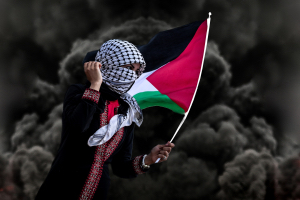
Commentary
 By Venkatesh Raghavan
By Venkatesh Raghavan
The tensions between Israel and Palestine have witnessed a steep escalation these days. This is despite expectations that at least in the Holy month of Ramadan there would be a truce in the disputed territories including the West Bank and the Gaza strip that is bordered and patrolled by Egypt on the other side. In the build-up to the Holy month, there were three incidences of violence in which Israeli civilians and soldiers were killed. Israel retaliated by gunning down all the assailants involved in the violence.
In the latest escalating spree of violence, Israeli forces shot dead five Palestinians including a 14-year-old, in the West Bank, today.
In East Jerusalem, Israeli policemen forcibly stormed the compound of the Al-Aqsa mosque. Medical staff present at the site reported that over 150 Palestinians sustained severe injuries in the attack. Within hours of the reported attack videos went viral on social media indicating violent clashes between Israeli police and Palestinian protestors. The protestors were shown hurling rocks at the police who retaliated with tear gas shells and stun grenades.
The violence took an ugly turn, with the Palestine authorities reporting that many injured people who had assembled for the pre-dawn prayers were trapped inside the compound owing to Israeli troops preventing the arrival of medical assistance including ambulances and paramedical teams. Observers tracked that the previous month had witnessed a sharp increase in incidences of violence between the warring sides. While Israel countered its mounting raids in West Bank citing that it was retaliatory action against Palestinians attacking Israeli cities, the Hamas led militant Palestinian groups complained about several instances of forcible evictions and civilian casualties that prompted such an escalation. Further, the Palestinian side contended that this happened to be the deadliest leash of violence on its civilian population since 2016.
This is also seen as a stark change since the truce was agreed upon in previous May after the death of 255 civilian and military personnel. Ironically, both the warring sides, namely the Israeli troops and the Hamas militants claimed victory in the May round of violence soon after the election of the new coalition government.
In a more recent development during the last week of March, it was reported that Israeli citizens sitting in a bar were killed by Palestinian gunmen. Israeli police claimed that the gunmen were tracked and shot dead in a retaliatory exchange of fire that ensued in an encounter. The Israeli Prime Minister Naftali Bennett announced that such violence will receive prompt remedial action, indicating the mounting of an Israeli offensive on Palestinian settlements. With Bennett officially going on record that the state of Israel has gone on an offensive, the attacks on Tel Aviv, and the mounting violence in Bethlehem, Jenin and Ramallah have reportedly stoked the fires of unceasing conflict during the Holy month of Ramadan.
Despite truce calls being effectuated between violent eruptions from time to time between Israel and Palestine, the status quo in the region has largely remained unchanged. The Palestinian refugee crisis for one has gone from bad to worse. The fate of the Jewish settlements in the West Bank is yet undecided. The decision to arrive at an accord that can lend formal recognition to a two-nation state is at present being regarded as a pipe dream.
*Consulting Editor of Global Bihari, and author of the book Operation Drug Mafia marketed by Times Group.





